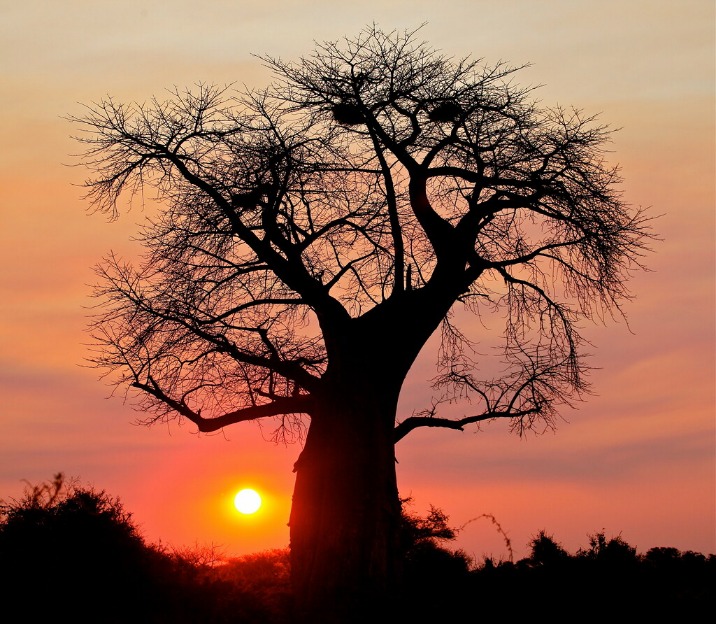Geography and Landscape
Geography and landscape play a vital role in shaping the unique environment of Botswana. This country in southern Africa is known for its diverse landscapes, including vast deserts, lush wetlands, and expansive savannas. Understanding the geography of Botswana provides insight into its rich wildlife, natural beauty, and cultural heritage, making it a fascinating topic for exploration and discovery.
Thamalakane River and Okavango Delta
Botswana is renowned for its stunning landscapes and unique geographical features, including the Thamalakane River and the Okavango Delta. The Thamalakane River flows through the northern part of the country, feeding into the Okavango Delta, one of the world’s largest inland deltas. The delta is a UNESCO World Heritage Site and is famous for its diverse ecosystems, including lush floodplains, papyrus swamps, and rich wildlife. These natural formations create an incredible environment for wildlife safaris, making Botswana a top destination for nature enthusiasts. The Okavango Delta is also unique because it floods annually, transforming the landscape into a vast, water-filled paradise that supports a variety of flora and fauna. The geography of Botswana, with its rivers and delta, plays a vital role in sustaining the country’s rich biodiversity and attracts millions of tourists each year.
Makgadikgadi Salt Pans
One of Botswana’s most fascinating geographical features is the Makgadikgadi Salt Pans, which are among the largest salt flats in the world. Located in the center of Botswana, these expansive pans cover an area of around 12,000 square kilometers. They are the remnants of an ancient lake that once filled the region, creating a vast, flat, and shimmering salt surface that stretches to the horizon. The landscape is characterized by its white salt crust, which contrasts beautifully with the surrounding semi-arid savannah. During the rainy season, the pans temporarily fill with water, transforming into a wetland that attracts a diverse array of wildlife, including flamingos and wildebeests. The unique landscape of the Makgadikgadi Salt Pans offers an incredible opportunity for eco-tourism, history, and understanding the Earth’s changing climates, making it a notable fact about Botswana’s rich natural heritage.
Hills and Plateaus
Botswana is renowned for its diverse landscape, featuring vast plains, rolling hills, and expansive plateaus that define its unique geography. The country is situated on the Central African Plateau, which covers most of its territory and provides a flat, high-altitude environment. Hills are commonly found throughout Botswana, especially in regions like the Kalahari Desert, where isolated hill formations add to the scenic beauty. Plateaus, such as the Tsodilo Hills, are notable for their geological significance and are considered sacred by local communities. These elevated landforms not only shape the climate and biodiversity of Botswana but also attract tourists eager to explore its natural wonders. Overall, the varied terrain of hills and plateaus plays a vital role in the country’s rich ecological and cultural landscape, making Botswana a fascinating destination for nature lovers.
Culture and Traditions
Culture and traditions are the vibrant threads that weave the rich social fabric of Botswana. They reflect the history, beliefs, and customs of the many communities that call this beautiful country home. Exploring Botswana’s unique cultural heritage offers fascinating insights into its traditions, festivals, and everyday life, making it an intriguing subject for those interested in learning about this captivating nation.
Distinctive Tribal Customs
Botswana is renowned for its rich cultural heritage and diverse tribal customs that have been preserved over centuries. The country is home to several ethnic groups, each with its unique traditions, dances, and rituals that reflect their history and beliefs. These customs are an integral part of their identity and are celebrated through festivals and community gatherings.
Among the most distinctive tribal customs are the traditional ceremonies of the San people, known for their deep spiritual connection with nature and their unique rock art. The Tswana tribe, one of the largest in Botswana, observes rites of passage such as initiation ceremonies that mark the transition from childhood to adulthood. These customs often involve elaborate dances, storytelling, and the wearing of traditional attire made from locally sourced materials.
Music and dance play a vital role in Botswana’s cultural expression, with each tribe having its unique styles that are performed during significant events. For example, the dikgafela dance of the Bakgatla tribe is a vibrant celebration that showcases the community’s history and social values. Overall, Botswana’s tribal customs exemplify the nation’s commitment to maintaining its cultural diversity and passing these traditions to future generations.

Traditional Music and Dance
Botswana is a country rich in culture and traditions that have been preserved over centuries. Its community practices and celebrations reflect deep-rooted values and a strong sense of identity. Traditional music and dance play a vital role in expressing their heritage, showcasing stories, history, and social bonds.
Music in Botswana often features instruments like the reed flute, drum, and thumb piano, which produce rhythmic and melodic sounds unique to the region. Dances such as the Ngoma and Tswana dance are performed during festivals, ceremonies, and social gatherings, often involving energetic movements and colorful attire. These cultural expressions foster community spirit and keep Botswana’s vibrant traditions alive for future generations.
Local Crafts and Artisans
Botswana is renowned for its rich culture and vibrant traditions that have been preserved for generations. The country’s festivals, music, and dance reflect the deep-rooted history of the Tswana people and other ethnic groups. Traditional attire and ceremonies play a vital role in showcasing Botswana’s cultural identity, creating a sense of unity and pride among its citizens.
Local crafts and artisans are a vital part of Botswana’s cultural landscape, producing stunning handmade items that capture the essence of the country’s heritage. From intricate beadwork and woven baskets to wood carvings and pottery, these crafts showcase the skilled craftsmanship passed down through ages. Markets and craft fairs provide avenues for artisans to display and sell their creations, supporting both cultural preservation and local economies.
Wildlife and Natural Resources
Botswana is renowned for its rich wildlife and abundant natural resources, making it a top destination for nature enthusiasts and safari lovers. The country’s vast landscapes, including the Kalahari Desert and lush Okavango Delta, provide diverse habitats that support an incredible array of flora and fauna. Exploring Botswana offers unique opportunities to discover its vibrant ecosystems, conservation efforts, and the fascinating fun facts about its natural treasures.
Unique Species of Flora and Fauna
Botswana is renowned for its rich wildlife and diverse natural resources, making it a fascinating destination for nature enthusiasts. The country is home to a wide array of unique flora and fauna, many of which are found nowhere else in the world.
- The African elephant population in Botswana is one of the largest globally, particularly in the Chobe National Park.
- Kanana, a rare plant species, is endemic to the Okavango Delta, thriving in its unique wetland environment.
- The country’s forests host the rare Ebony trees, valued both ecologically and culturally.
- Leopards are notably prevalent in Botswana’s wildlife reserves, often referred to as the “King of Beasts.”
- The Okavango Delta is a UNESCO World Heritage Site, known for its unique ecosystem supporting diverse plant and animal species.
- Botswana’s biodiversity includes the endangered African wild dog, a highly social and elusive predator.
- The Baobab tree, often called the “Tree of Life,” is a symbolic and iconic species native to Botswana’s landscapes.
- The country is a sanctuary for over 600 bird species, including the rare Pel’s fishing owl and African skimmer.
- Rhinos, both black and white, are protected within Botswana’s reserves, contributing to conservation efforts.
- Unique aquatic plants thrive in the seasonal floodwaters of the Okavango, supporting a complex food web.
Conservation Efforts
Botswana is renowned for its rich wildlife and dedicated conservation efforts that have made it a leader in preserving natural resources. The country boasts vast expanses of protected areas, including national parks and game reserves, which serve as vital habitats for a diverse array of species. Efforts by the Botswana government and local communities have significantly contributed to sustainable wildlife management and conservation initiatives.
- More than 17% of Botswana’s land area is designated as protected, including the famous Okavango Delta and Chobe National Park.
- The Okavango Delta is one of the world’s largest inland deltas and is a UNESCO World Heritage Site, supporting unique ecosystems and hundreds of bird species.
- Botswana has implemented strict anti-poaching laws that have substantially reduced illegal wildlife killings, especially of elephants and rhinos.
- Community-based conservation programs actively involve local populations in wildlife protection and eco-tourism development.
- Approximately 40,000 elephants inhabit Botswana, making it one of Africa’s top elephant populations, all under careful management to prevent overexploitation.
These conservation efforts have not only helped safeguard Botswana’s natural beauty but also boosted eco-tourism, providing economic benefits while ensuring the sustainability of its natural resources for future generations.
Endangered Animals
Botswana is renowned for its rich wildlife and abundant natural resources, making it a premier destination for nature enthusiasts. The country is home to vast national parks like Chobe and Moremi, which host a diverse array of wildlife including elephants, lions, leopards, and rhinoceroses. Many of these animals are endangered due to habitat loss and poaching, highlighting the importance of conservation efforts in the region.
One fascinating fact about Botswana is its successful initiatives to protect endangered species such as the African wild dog and the black rhinoceros. The country’s commitment to conservation has helped stabilize some populations, although challenges remain. Botswana’s commitment to sustainable tourism and wildlife protection underscores its role as a leader in conserving Africa’s natural heritage.
Economy and Development
Botswana, a landlocked country in Southern Africa, boasts a fascinating economy tied closely to its rich natural resources and innovative development strategies. Known for its stable political environment and commitment to sustainable growth, Botswana’s economy has evolved beyond diamond mining to include tourism, agriculture, and manufacturing. Exploring fun facts about Botswana reveals how this nation’s unique approach to development has shaped its success and cultural identity.
Major Industries
Botswana’s economy is primarily driven by its rich natural resources, especially diamonds, which account for a significant portion of its revenue and exports. The country has seen steady economic growth over the years due to its prudent management of mineral resources and focus on sustainable development.
Major industries in Botswana include diamond mining, which is considered the backbone of its economy, along with tourism, agriculture, and manufacturing. The tourism sector is bolstered by Botswana’s unique wildlife and national parks, attracting visitors from around the world. Agriculture remains vital for local food production and employment, although it is less dominant compared to mineral-based industries. Overall, Botswana’s diverse economic activities contribute to its status as one of Africa’s most stable economies.
Tourism Highlights
Botswana is renowned for its impressive economic stability and consistent development efforts, largely driven by diamond mining, which constitutes a significant portion of its GDP. The country has made remarkable progress in reducing poverty and enhancing infrastructure, positioning itself as an emerging market in Southern Africa. Tourism plays a vital role in Botswana’s economy, attracting visitors with its rich wildlife, pristine national parks, and unique natural wonders. The country’s commitment to conservation has preserved an abundance of biodiversity, making it a top destination for eco-tourism enthusiasts. Highlights include the Okavango Delta, one of the world’s largest inland deltas, and Chobe National Park, famous for its large elephant populations. Additionally, Botswana is celebrated for its friendly hospitality, vibrant cultural heritage, and efforts to promote sustainable tourism, ensuring that its natural beauty continues to thrive for future generations.
Agriculture and Livestock
Botswana is known for its strong economy primarily driven by diamond mining, which contributes significantly to the country’s GDP and export earnings. The nation has made remarkable progress in development, focusing on sustainable growth and improving living standards for its citizens. Agriculture and livestock also play vital roles in Botswana’s economy, providing employment and food security for many rural communities. The country’s diverse landscape supports cattle farming, which is a traditional livelihood, and the government continues to promote innovations in agriculture to boost productivity and resilience against climate change impacts.
Fun Facts and Unique Attributes
Botswana is a remarkable country full of fascinating facts and unique qualities that make it stand out on the African continent. From its diverse wildlife to its rich cultural heritage, Botswana offers a wealth of interesting insights for curious explorers. Discovering these fun facts not only enriches our understanding of the nation but also highlights its special characteristics that distinguish it from other nations.
Has One of the Largest Salt Pans
Botswana is home to one of the largest salt pans in the world, the Makgadikgadi Salt Pan. This vast expanse of salt flats is a breathtaking natural wonder that covers approximately 12,000 square kilometers, making it one of the most impressive features in the country. The salt pan is a remnant of an ancient lake that dried up thousands of years ago, creating a unique landscape that is both stark and beautiful. Visitors often marvel at its extraordinary size and the opportunities it offers for stunning photography and wildlife viewing.
Home to the Largest Population of Elephants in Africa
Botswana is renowned for its incredible wildlife and natural wonders, making it a fascinating destination for nature enthusiasts. One of its most impressive attributes is serving as the home to the largest population of elephants in Africa, offering a unique opportunity to observe these majestic creatures in their natural habitat.
- Botswana’s Elephant Population: The country hosts over 130,000 elephants, the highest concentration in Africa, primarily found in the Chobe National Park and the Okavango Delta.
- Unique Wilderness Areas: Botswana’s protected areas are some of the largest and most pristine in Africa, providing safe haven for diverse species.
- High Conservation Success: The country’s commitment to conservation has helped maintain stable and thriving populations of elephants and other wildlife.
- Distinct Ecosystems: Botswana features a variety of ecosystems, from lush waterways in the Okavango Delta to semi-arid savannahs, supporting a diverse range of flora and fauna.
- Traditional Cultures: The indigenous Tswana people have rich cultural traditions that are deeply connected to Botswana’s natural environment, influencing conservation efforts.
Official Language and Multilingual Society
Botswana is known for its rich cultural diversity and unique natural attractions. One fun fact is that it is home to the world’s largest inland delta, the Okavango Delta, which creates a lush oasis in the middle of the desert. Additionally, Botswana has a tradition of being one of the most stable democracies in Africa, with a strong commitment to conservation and wildlife protection.
The country boasts several unique attributes, including its commitment to environmental sustainability and its thriving tourism industry centered around wildlife safaris. Botswana’s dedication to conserving its pristine ecosystems makes it a standout destination for nature lovers.
The official language of Botswana is English, used in government, business, and education. However, the country is also a multilingual society where Setswana is widely spoken in daily life. Many Batswana are bilingual or multilingual, often speaking several local languages such as Kalanga, Sekgalagadi, and Shona, reflecting the country’s diverse cultural heritage.
High Literacy Rate
Botswana is renowned for its impressive literacy rate, which is one of the highest in Africa, reflecting the country’s strong commitment to education. Fun facts about Botswana include its vast and stunning Okavango Delta, a UNESCO World Heritage Site that is one of the world’s largest inland deltas and a haven for diverse wildlife. The country is also home to the Tsodilo Hills, known as the “Louvre of the Desert” due to the thousands of ancient rock paintings found there. Additionally, Botswana has a stable democracy and a peaceful history among African nations, making it a unique and interesting country to explore.





0 Comments